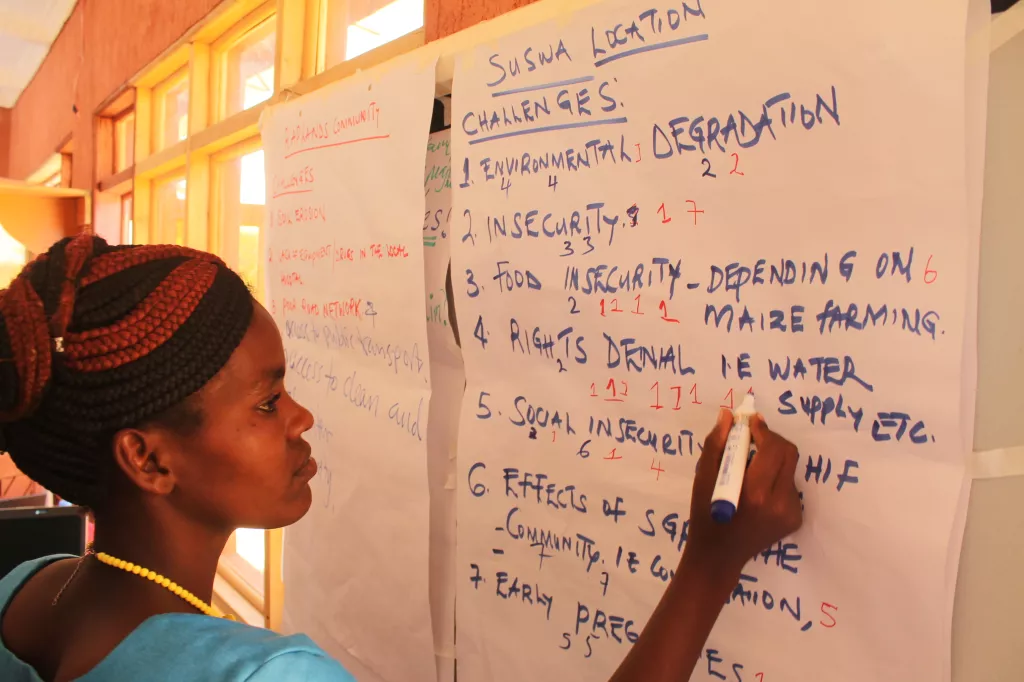The Inclusive Growth Project

Photo: Mercy Koini
Brief Overview
The Inclusive Growth Project Through Decent Work is an innovative project based on the Public-Private Development Programme (PPDP) model and aims at poverty reduction and improved living conditions through decent work and access to rights-based services among the rural population in the Great Rift Valley.
Supported by the Embassy of Sweden - Nairobi, The Inclusive Growth Project is co-implemented by International Labour Organisation (ILO) and ForumCiv, with ILO being the lead partner.
Strategic Approach
Public-Private Development Partnerships (PPDP) is a modality for concrete cooperation between Sida and private sector actors. PPDPs encourage the private sector to proactively create business ventures that also improve conditions for people in poverty. The overarching objective of the PPDP is to increase economic opportunities for people living in poverty.
International Labour Organization (ILO) is the lead coordinator of the project and will also implement outcome 1 and 2 (skills development and job creation through micro- and small enterprise development). ForumCiv as the co-coordinators to implement outcome 3, which will work on building capacity of the communities to lobby for increased access to public and social services.
Among many other activities, ForumCiv will focus on training the community on the use of a community-based participatory approach (known as The Right(s) Way Forward) which will empower them to access their rights through lobbying, public participation in county governance & decision-making spaces and strengthening their oversight role in public service provision
Key Stakeholders
The Public-Private Development Partnership project has a wide range of institutions with which it will collaborate and mutually engage with in a bid to improve the conditions of the targeted communities.
Currently the identified partners in this PPDP Project include Ministry of Energy, Ministry of Education, Science and Technology, Ministry of Labour and Social Protection, Akiira Geothermal Ltd, Kenya Electricity Generating Company Ltd (KENGEN), other Power Developers, County Governments of Narok and Nakuru, and other strategic partners including Federation of Kenya Employers, Central Organization of Trade Unions COTU-K, Micro and Small Enterprise Authority (MSEA), National Industrial Training Authority (NITA).
The Project Summary
Project goal
Poverty reduction and improved living conditions through decent work and access to rights-based services among the rural population in the Great Rift Valley
Objectives
- To create decent jobs from better skills by vocational training centres.
- To develop new and improve on growing businesses resulting from new relevant skills, business development services and access to finance.
- To increase the capacity of communities to lobby for increased access to public and social services e.g. water, education, health, sanitation and counties are better able to provide the basic services.
Project Duration
May 2018 - May 2022
Budget
USD 4,870,000
Expected Outcomes
- Decent jobs from better skills provided by vocational training centres
- Decent jobs, new and growing businesses resulting from new and relevant informal skills, business development services and access to finance.
- Communities have the capacity to lobby for increased access to public and social services, while the County Governments have increased capacity to supply those services.
Ultimate target Group
The ultimate target groups are youth, women and vulnerable community members in the Suswa and Raplands as well as the local stakeholders in targeted constituencies in Nakuru and Narok Counties.